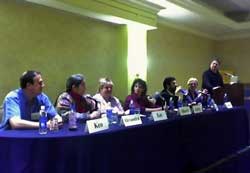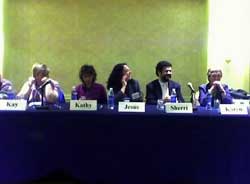Saturday afternoon at ClickerExpo we always have the Panel Discussion. Sounds boring? Actually, it's a high point. The questions are interesting, the answers are pithy, and the panelists are FUNNY. Put six of us on the same platform, plus our moderator Aaron who is nonstop funny anyway, and you get a lot of laughs in that hour and a half, as well as a lot of good info. "Better than the Tonight Show," one attendee said, "plus you don't have to stay up late."
Anyway, at one ClickerExpo panel discussion the serious question was asked, "What makes a good trainer? Can you tell that someone is going to be a good trainer?"
I answered first, and said no, I can't tell. Sometimes a

person who seems all thumbs and resistance when they first try can suddenly "get it" two years later and blossom into a fantastically inventive trainer. On the other hand, there are fast starters, the person who picked up a clicker to work with a horse, say, and then tells you, "That worked so well I went inside and trained the cat, the dog, the kids' guinea pig, and the parakeet." That quick learner, however, may not develop further. The panelists noted that some people are content to stay at the entry-level stage.
Kathy Sdao said that she looks for creativity and the ability to "think laterally," to see several ways around a problem rather than being blocked by it. Ken Ramirez works in the marine mammal world, the zoo world, and the working dog world, and has probably developed more professional trainers than any of us. Ken said he looks for intense interest in the operant technology, combined with compassion for the animal. What a great word: compassion.
It made me think about our attendees. We teach and teach for three intense days (with compassion for our learners, I hope, because it's a strenuous experience). It's easy during those three days to spot people who are not yet "getting it," if only because of the rich and startling variety of their superstitious habits and explanations. But which of those attentive faces is going to become a great trainer? Which ones will be making the next wave of innovations in operant training and science? We can't tell, but we know they're among us.
Time magazine once ran an article by Lev Grossman* discussing a new phenomenon in the growth of ideas. Grossman writes, "Things, broadly speaking, used to be invented by a small, shadowy elite, that might be called the People Who Happened to Be in the Room at the Time (engineers, sitcom writers, chefs). They were probably very nice and they may even have been very, very smart, but however smart they were, they're almost certainly no match for a less elite but much, much larger group: All the People Outside the Room."
Grossman mentions open-source software as an example of large-group creativity, and then goes on: "The idea that lots of people, potentially everybody, can be involved in the process of innovation is utterly transforming. Two things make this possible, one obvious and one not. The obvious one is—say it with me—the Internet. The other one, the surprising one, is a curious phenomenon you could call intellectual altruism. It turns out that given the opportunity, people will donate their time and brainpower to make the world better."

Our ClickerExpo faculty is a living example of that. They fly in from far away, they sacrifice at least a week out of their personal and working lives to join us, they could certainly make more money doing something else—and they do it for everyone's benefit, including their own. Attendees also make sacrifices, of time, of money, of strength—and also for more than just their own good. The skills and ideas they carry away will benefit many others.
We can't tell, though, who will be a major part of the future. Who in the crowd will come up with key creative insights, or new and solid clicker research, or the next great teaching paradigm? Will it be that quiet, wide-eyed young woman from Japan? Or the group of eleven TAGteachers (eleven, mind you!) that came from Ireland? Or that twelve-year-old who supposedly just came along to serve as puppy-sitter? Maybe all of them! We don't know. But we know you are among us.
In closing his Time essay, Lev Grossman makes a prediction: "Until now the value of a piece of intellectual property has been defined by how few people possess it. In the future the value will be defined by how many people possess it."
Exactly. And that's what we're ALL doing together, at ClickerExpo: sharing the wealth. And changing the world. One click at a time.
* "The Next Big Thing is Us," by Lev Grossman, Time, March 20, 2006.



Post new comment